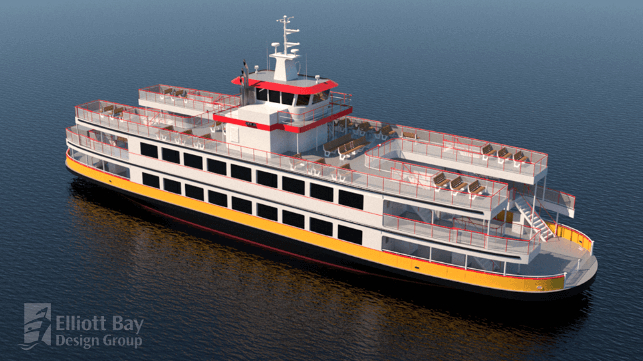Casco Bay Line's Plug-In Hybrid Ferry is Set to Start Construction

Elliott Bay Design Group (EBDG) has announced that the hybrid-electric passenger vehicle ferry it has designed for Casco Bay Lines will soon start construction at the Rhode Island-based shipyard Senesco Marine. The 164-foot ferry will replace an aging diesel-powered ferry on a short-run route in Portland, Maine. Its fuel-efficient design will reduce CO2 emissions by 800 tonnes per year, EBDG says, and will help to improve local air quality at the same time.
The ferry will operate on a two nautical mile fixed route between Portland's Old Port and Peaks Island, a popular summertime destination in Casco Bay. EBDG has been working with Casco Bay Lines to prepare for the project since 2018. Before settling on a final design, the firm conducted a study to compare different propulsion options based on capital cost, operating cost, reliability and CO2 emissions, among other factors.
Casco Bay Line ultimately went with a diesel-electric system from ABB, which can run in either a hybrid mode or a battery-only mode. ABB is also providing a shore charging station for the batteries, which will be installed on the Portland side of the route. With the ability to run on diesel when needed, the ferry can maintain service even if shore charging is not available.
The ferry has capacity for 15 vehicles and 599 passengers. The double-ended configuration means that the ferry will not have to turn around at each end of the run, and it reduces the required speed and energy consumption for the new vessel - even though it is larger and has more capacity than its predecessor. It is expected to enter service in 2024.
Ferry routes like the Portland-Peak Island run are ideal for plug-in hybrid technology, EBDG principal John Waterhouse told The Maritime Executive last year. These vessels have a predictable duty cycle, and their regular routes and fixed terminals are perfect for installing charging infrastructure.
"Hybrid is well past the early adopter stage for ferry applications, and we owe thanks to our friends over in Norway who have taken the lead in developing and deploying it," says Waterhouse. "Operators can think of this as a mature technology and a viable option for their fleet. Perhaps the real question is whether you want to be the last adopter.”
